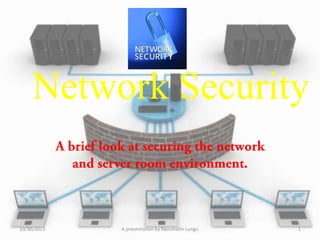Network security
- 1. Network Security 10/30/2013 A presentation by Nkosinathi Lungu 1
- 2. Why Network Security? We need our networks secured because there are a lot of threats to networks from hackers and software’s. Our networks hold a lot of data some of which is confidential and could lead industry sabotage and espionage and so it must be protected. 10/30/2013 A presentation by Nkosinathi Lungu 2
- 3. Common Security Threats There are several threats to computer networks some of the most common being; Viruses Worms and Trojans Spyware and Adware Hacker Attacks Denial of Service Attacks Data interception and theft Identity Theft 10/30/2013 A presentation by Nkosinathi Lungu 3
- 4. Securing the Network There are several ways in which we can ensure that our networks stay secure like; Authentication: All users of the network must enter some credentials to prove that they have authority to access what’s on the network Firewalls: Once a user logs on a firewall can ascertain what rights the user has on the network and what resources are available to that user. Antivirus and Antispyware: Also essential for the network security as this will be able to block any malicious software that tries to run on your machine Password Policies: Users should be prompted to change their passwords at least every other month. 10/30/2013 A presentation by Nkosinathi Lungu 4
- 5. Securing the Network continued Network Analyzer: This can be used to monitor who is logged onto the network and what resources they are accessing Network Key: In the case of wireless networks it’s important that users must enter a network key before being allowed on the network. Encryption: encryption software can be installed on the networks so that any outsider accessing the information won’t be able to read it. Physical Access to data areas: All places with terminals on the network must be secured so that no one can just access them 10/30/2013 A presentation by Nkosinathi Lungu 5
- 6. Servers What is a Server? A server is a system either hardware or software that responds to requests across a network to provide services Servers are central to a network as they hold all the data from user access data to personal and the organizations data. 10/30/2013 A presentation by Nkosinathi Lungu 6
- 7. Server Room What is a Server room? A server room is a room where the organizations servers are kept and as such they need to be secured Server Rooms can also be used to keep backups as well as house switches and routers 10/30/2013 A presentation by Nkosinathi Lungu 7
- 8. Securing the Server Room Some ways to secure server rooms are; Isolation: It is important that the server room is isolated and kept away form human traffic Physical Access: Users should authenticate themselves before entering the server room. There are several ways to do this like keycards, Door access code locks or biometrics like fingerprint. Monitoring: If possible have cameras in and around the server room so that you can monitor who is accessing the room. Server Racks: Keep servers in racks as they are secure and can be locked that way even if someone breaks into your server room they can’t access the server. 10/30/2013 A presentation by Nkosinathi Lungu 8
- 9. Securing the Server Room Continued Smoke Detectors: In case of a fire the smoke detectors will go off and the fire can be put off before any damage is done. Elevation: Make sure that the servers are all off the ground so that in the event of flooding there is less likelihood of them getting affected. Air Conditioning: Servers like other computers produce heat and depending on the traffic they get they can get really hot so it’s important that the server room is air conditioned Windows: Ensure that there are no windows to the server room or if there are they should be well secured Password Lockouts: It is advisable to set your servers so that they can lock after a few failed log in attempts. 10/30/2013 A presentation by Nkosinathi Lungu 9
- 10. Summary We see that it is important to secure our networks for various reasons because they are used to store sensitive and important data which we want to keep secure as it might be used for malicious intent in the wrong hands. 10/30/2013 A presentation by Nkosinathi Lungu 10

